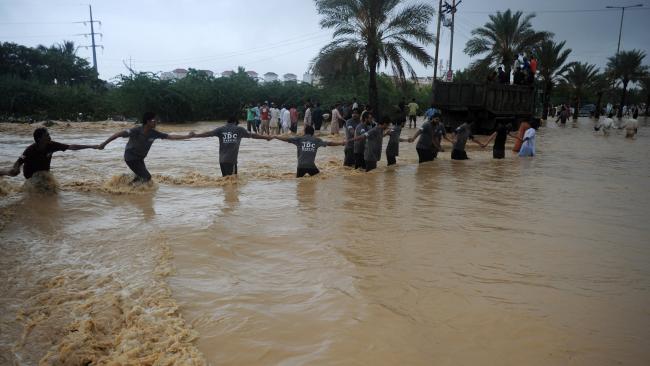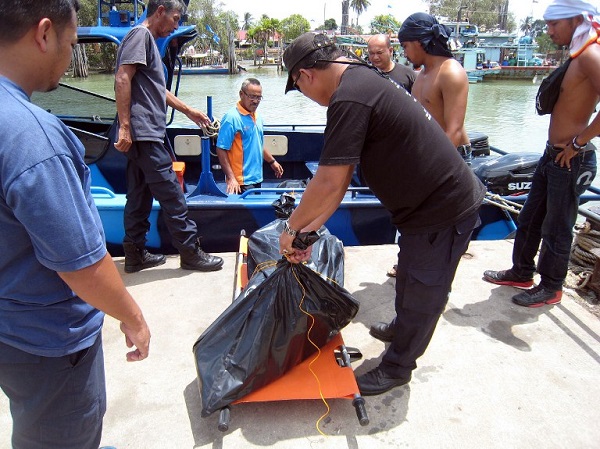
In a city with no shortage of hard jobs, Khwaja Naqib Ahmad lays claim to one of the toughest of all — burying the unclaimed dead.
Mr. Ahmad, left, with his colleague Ghulam Sarwar. They work at a graveyard where suicide bombers are buried.
Interred in his graveyard are orphans, homeless people and other nameless victims, who are sent off with a prayer and a tablet-shaped headstone. But increasingly the bodies that turn up here belong to another class of the unwanted: suicide bombers.
Mr. Ahmad has been a municipal government courier for the last five years, responsible for shuttling bodies between the morgue and his sloped and barren plot of rocky soil on the eastern edge of Kabul. It has been a period marked by a steady stream of suicide attacks, which were virtually unheard-of in 2001, when the war began.
The work has grown harder for Mr. Ahmad, exacting as much of an emotional toll as a physical one. He says virtually nothing of his work to strangers, seeking comfort in the Koran. The scent of decomposed flesh lingers on his clothes. In the winter, when the roads are impassable, he hoists the corpses on his shoulders and carries them. The cemetery sits on a slight hill overlooking an emerald lagoon, incongruously beautiful.
“I look at them as humans and treat their bodies with respect because I believe that they were full of hope and life when they were alive,” he said. “I do not think about what they do. I become sad when somebody cuts a tree, let alone when people kill each other.”
For years he has searched for a replacement, someone to handle the physical challenge — turning the unyielding earth in sun and snow — and the mental tax the work exacts. They all turn him down. So the 52-year-old father of eight with a salt-and-pepper beard carries on, often with the help of a friend.
Three times a week, he visits the site, situated just past a mud village on the way out of town. He comes to tend to the graves and to ensure that no one has tampered with his work. He lives in fear that the Taliban will come to reclaim the bodies of their bombers. Only once has a family tried to collect remains.
“Normally no one claims the bodies,” he said. “Most of these people don’t have families.”
Having made peace with the worst of his work, Mr. Ahmad has found ways around the grim details. Every time there is a suicide attack, he says, his colleagues circle his desk at the municipal center in central Kabul, smiles edging up their faces.
“My colleagues make fun of me: ‘Khwaja, be prepared, there is another attack!’ ” he said.
“What can you do?” he continued. “Afghanistan has been at war for the last 30 years. One of the ways we have survived is a sense of humor.”
Empathy for the authors of indiscriminate violence is scarce here, but Mr. Ahmad finds his humanity in Islam.
“Every single Muslim’s duty is to bury his Muslim brother, no matter how rich he is, poor he is or what social status he comes from,” he said. “To me, my job is important. I don’t care who I am burying. I see no difference between the addict or the bomber.”
Suicide attacks have remained somewhat steady since 2009, averaging about 150 a year, according to statistics from the NATO-led coalition. But the complexity of attacks and the number of bombers have increased.
Violence has been especially focused on Kabul this summer, as the insurgency targets the heart of the national government. At least a half-dozen major suicide attacks have rattled the city in the last three months, striking American convoys, international aid agencies, the Supreme Court and a hotel believed to house Western intelligence personnel.
Attacks come in many forms, and typically at the hands of young men. Often educated in madrasas in Afghanistan or neighboring Pakistan, they have memorized religious scriptures day after day. The more sophisticated insurgent groups plan their attacks for months or longer, training their attackers in weapons and explosives before carrying out orchestrated assaults on high-value targets.
Some, like the bombers that attacked the Ariana Hotel in June, near the presidential palace, speak English and are well financed. In that attack, the insurgents drove vehicles outfitted to look armored. They wore American military uniforms and carried high-quality counterfeit coalition identification badges, according to coalition officials.
At the International Organization for Migration, an agency that has worked with the United Nations and another target this summer, six insurgents stormed the compound and fired rockets on it from neighboring rooftops, staging a six-hour battle in the heart of the city. For these long battles, they bring little to sustain themselves: often just water, pistachios and a pocketful of Pakistani rupees.
The insurgents usually fight to the death, leaving a trail of carnage in their wake. When the bloodshed ends, Mr. Ahmad is there to collect the bodies.
On a clear day last month, Mr. Ahmad and his colleague, Ghulam Sarwar, arrived at the cemetery to bury three anonymous bodies. Were they among the attackers who had recently carried out the assault on the Ariana Hotel? The men would not say, but often the bodies of attackers are kept for weeks as they undergo forensic examination, breaking with the Islamic tradition of burying the dead within 24 hours.
The corpses arrived in white shrouds, their stench faintly masked by a rose perfume. The men took the bodies to the top of the graveyard, where crude tombstones jut into the air like crooked teeth. White and blue latex gloves used to handle the departed covered the ground.
With a pickaxe and shovel, the men widened the pre-dug graves, raking stones from the earth the size of melons. Sweat poured from their brows.
They placed the bodies into the ground and covered them with the sun-bleached earth. When they finished, Mr. Ahmad tucked a flat black stone at the head of each grave and marked them with a number. The men poured water over the mounds, rubbed their hands and faces, and turned toward Mecca to pray.
Sunday 4 August 2013
http://www.nytimes.com/2013/08/04/world/asia/a-days-toil-in-the-suicide-bombers-graveyard.html?_r=0


